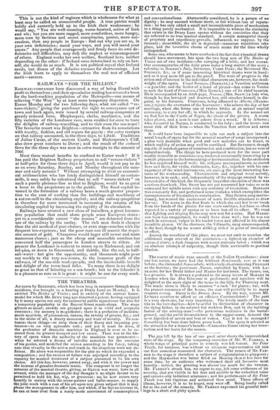RAILWAYS "FOR THE MILLION."
RAILWAY-COMPANIES have discovered a way of being liberal with profit to themselves ; and their speculative trading has secured a boon for the hard-working population of the Metropolis—one means of relieving "the Wen" by at least some temporary dispersion. On Easter Monday and the two following days, what are called "re- turn-tickets," giving the purchaser the right to convey ance out of town and back again, were issued by several railway-companies at greatly reduced fares. Shopkeepers, clerks, mechanics, and the fifty varieties of the Londoner race, were enabled for once to taste the delights of railway-travelling, and to visit even the sea-coast ! The favourite resort was Brighton—attractive from its associations with royalty, fashion, and old repute for gayety : the extra receipts on that railway amounted, in the three days, to 1,943/. Traditions of Julius Cmsar, of the ancient Castle, and Shakespeare's Cliff, also drew great numbers to Dover; and the result of the 'reduced fares for the three days was seen in extra receipts to the amount of 700/.
Must these mutual benefits be confined to Easter week ? If it has paid the Brighton Railway proprietors to sell " return-tickets " at half-price for those three days in April, would it not pay to do so on every Saturday, Sunday, and Monday throughout the sum- mer and early autumn ? Without attempting to rival an economi- cal arithmetician who has lately distinguished himself on cotton- mills, it may safely be calculated that to sell " return-tickets" on such a purely pleasure-line as that to Brighton, would be as great a boon to the proprietors as to the public. The fixed capital in- vested in the formation of a railway bears a much greater propor- tion to the cost of working than the buildings and machinery of a cotton-mill to the circulating capital ; and the railway-proprietor is therefore far more interested in increasing the returns of his circulating capital by increasing the rapidity of its circulation.
Railway s have created a new class of travellers, a great locomo- tive population that could alone people some European states : yet to a considerable extent "the masses" are debarred front the use of the railway by the outlay. The rich man finds it cheaper than the old method of post-chaises, or even stage-coaches with the frequent inn-expenses ; but the poor man can ill muster the requi- site amount of gold. Cheapness would beget still newer and more numerous classes ; just as the cheap and accessible omnibus has converted half the passengers in London streets to riders. At present the Londoner is content to steam up to Richmond, and eat eel-pies, or down to Gravesend, and dabble, like the eel, in half- salt-water : but give the opportunity, and thousands might pour out weekly to the very sea-coasts, to the immense profit of the railways, of the sea-side tradespeople, and the incalculable benefit and delight of the town-bred folks. To many there is no delight so great as that of loitering on a sea-beach ; but to the inlander it is a pleasure as rare as it is great : it might be one for every week.


























 Previous page
Previous page